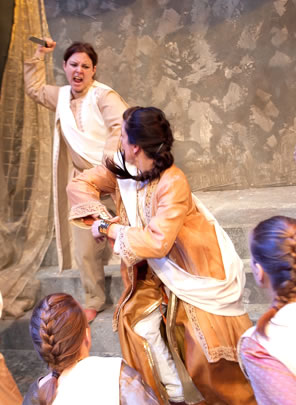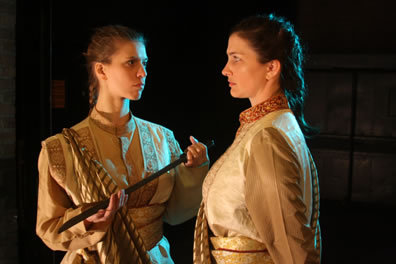Julius Caesar
An Amazonian Take on Ancient Rome
Babes With Blades Theatre Company, Raven Theatre, Chicago, Ill.
Saturday, April 20, 2013, second row center in studio theater
Directed by Wyatt Kent

Casca (Alison Dornheggen) moves to stab Caesar (Maureen Yasko) in the Babes With Blades production ofJulius Caesar. Photo by Johnny Knight, Babes With Blades.
Babes With Blades is an all-woman acting company that specializes in stage combat, even commissioning pieces centered on women fighting. William Shakespeare's Julius Caesar is a play that specializes in words, a piece centered on men talking. When Babes With Blades does Julius Caesar, you get a lot of talk and a lot of fight, but you don't get much fight in the talk. Lacking such intensity in the delivery of the speech-heavy text, we get a serviceable presentation of Shakespeare with exciting interludes of combat along the way.
This company even inserts combat into the text. The battles that Shakespeare leaves off stage in the final scenes are conducted on stage in sword-swinging brawls and ear-piercing yells. The First Folio text has no specific direction for the rioting plebeians to set upon Cinna the poet though the text insinuates that they do, and this gives the Babes reason for an extended bit of mob violence as the gang beats Cinna senseless with punches to the stomach and kicks to the head before dragging him off.
The most notable fight appended to Shakespeare's text is the actual assassination (original stage direction: "They stab Caesar"). Maureen Yasko as Caesar does not succumb meekly. When Casca, behind Caesar, raises his knife and shouts, "Speak hands for me," Caesar reacts, turning around and blocking the blow. Yasko's Caesar then fends off attacks from the rest of the conspirators until Brutus grabs him from behind and strikes home. Caesar turns to see that it is Brutus who stabbed him. "Et tu, Brute? Then fall Caesar." Then fall upon Caesar the other conspirators, flailing away at Caesar dying upon the steps of the capital.
This fight does more than show off the company's primary skill set and provide an interesting take on the play's second-most-famous line. If Babes With Blades productions are built upon the combat they perform, then this particular fight would serve as the foundation for how Yasko would portray Caesar. Hers is a Caesar who is still an effective warrior with an imperial bearing exuding strength. Yasko resembles Katharine Hepburn in appearance and posture, so it's natural to think of this as a Caesar the way Eleanor of Aquitaine might portray him. With credentials that include time at the Atlanta Shakespeare Company, Yasko has a solid grasp of Shakespeare's verse, and she plays Caesar with shades of both a pompous self-regard and a natural ease among his fellows.
This Caesar has a noticeably special affinity for Brutus, played by Kimberly Logan. Yasko often looks to Brutus with an appreciative smile, and when Caesar passes by Brutus, Yasko places a hand on Logan's shoulder. It's as if Caesar regards Brutus as a trustworthy equal whereas Antony is merely the commander's young protégé. A betrayal by such a Brutus, as much as the cut itself, is enough to take the fight out of Caesar.
Brutus, meanwhile, is just as imperial as Caesar. Logan glides across the stage and converses in a steady tone of supreme confidence. He regards everybody with some suspicion and keeps a physical and emotional distance from his fellow Romans. At the end of their tent scene with its intense argument, Cassius (Sara Gorsky) moves to embrace Brutus, but Logan steps back and offers little more than a nod and handshake. "There is no more to say," Brutus says, Logan giving this line a curt delivery. A disappointed Cassius replies, "No more. Goodnight." With such an opaque Brutus, true motivation for his actions is never clear. He may be as honorable as he maintains, and Logan looks perturbed when, at the funeral, one of the plebeians shouts "Let him be Caesar." However, I'm not sure Brutus is thinking much around the next corner. The most emotion we see in him is some exasperation with Cassius and with Caesar's Ghost. "Now I have taken heart, thou vanishest?" he calls out after the ghost. "Ill spirit, I would hold more talk with thee." Notably, this is the first somebody in the play who does not give Brutus his way.
Gorsky's Cassius spends much of the play in frustrated agitation, first with Caesar, then with Brutus. This is a Cassius with serious self-esteem issues, and this seems to factor in to his interactions with both Caesar and Brutus. While we never see the arc of Cassius's relationship with Caesar, we do see one between Cassius and Brutus. Gorsky's Cassius has more than respect for Brutus. He adores him, yearns to be his confidante, but Brutus keeps putting him down. Did Cassius experience a similar arc with Caesar? Sometime in their past, they were close enough that Caesar challenged Cassius to a race across the Tiber, and Cassius tended to Caesar when the latter was sick in Spain. Sometime, somehow, Cassius lost favor with Caesar and was apparently displaced by Antony (and this may factor into Cassius's eagerness to have Antony killed, too; Gorsky even makes a move on Antony with knife poised after Caesar's assassination). And now, Cassius is falling out of favor with Brutus, too. The disagreements the two have concerning policy and strategy don't play out as Brutus's ultimate foolishness but as Brutus's ultimate imperialistic personality, though the effect is the same, ultimately undoing the conspiracy.
On the other side of the political divide, Diana Coates plays Antony with vocal vigor and a twinkle in her expression. In dialogue, this is an arresting Antony, interacting easily and evenly with his colleagues, and his post-assassination speech rises from a deep emotional love of Caesar to the point of screaming "Cry 'havoc!' and let slip the dogs of war." However, Coates delivers the famous funeral oration with little emotion or motion. It's a static number without the linguistic rises and falls and sly turns of phrases Shakespeare employs. The scene relies on the mob's reaction for its pivotal turning of the plot. Catherine Dvorak plays Octavius in a respectful mode; she's almost motherly toward Antony, though Antony is clearly the elder and has little regard for Octavius's life or battle experience. Never do we get a sense that Octavius is either scheming toward his own ascent or is downright dangerous.
Two minor performances stand out. Alison Dornheggen is a cynical Casca, and she plays her scene with Cassius in a most revealing way: Casca has strong political opinions about Caesar, but he's not so ready to take open action against him. Certainly, Caesar's dictatorship already makes it dangerous to talk such things, but only after Cassius insults him for being "a willing bondman" does Dornheggen's Casca puff up indignantly—"You speak to Casca, and to such a man that is no fleering tell-tale"—and commit to join the conspiracy and "set this foot of mine as far as who goes farthest." In Dornheggen's performance of this scene, we get all these subtle emotions in the character, and at scene's end we do not have any confidence that this Casca is all in. In fact, he needs much, much—much—prodding to attempt the first thrust. That prodding comes from Jennifer L. Mickelson as a hunchbacked Cinna the conspirator, who behaves with emotionless efficiency until the assassination when, with growing impatience, he keeps muttering at Casca; though we can't hear what he's saying, Cinna is clearly urging Casca to get closer to Caesar and make the first strike. Mickelson comes back in the play's second half as Messala, Brutus's lieutenant, and now, ramrod straight and eagerly loyal, she is a Messala who actually grabs a share of the spotlight in the play's waning scenes.

Cassius (Sara Gorsky, left) and Brutus (Kimberly Logan) have a complicated relationship in the Babes With Blades production of Julius Caesar, as Brutus seems to remain aloof to the frustration of a Cassius who has self-esteem issues. Photo by Johnny Knight, Babes With Blades.
Director Wyatt Kent made a couple of interesting alterations. A good one, given the 11-woman cast, was to cut Cicero from the storm scene; Dornheggen's Casca gives her speech to us about the raging heavans and the omens she sees. A puzzling cut is dropping Portia (Kim Fukawa) revealing her self-inflicted wound to Brutus; her whole speech leads up to that climax, but this key characteristic of Brutus' wife is excised in this production.
Full disclosure, here: Writing this review, I've had a hard time with the gender of my pronouns—he of the characters vs. she of the actresses. These men in character are women in portrayal. The costumes by Kimberly G. Morris are gorgeous, colorful ancient Romanesque tunics over khaki pants except for Caesar and Calpurnia who both wore floor-length, sari-like robes, but all of which made these Romans more like Amazons in appearance. The set, designed by Grant Sabin for this 52-seat studio theater, is three steps crossing the back of the stage with two columns and a sheer gold curtain draped around one of the columns in front of a daubed wall.
That this is an all-woman cast is immaterial to the play unless we get a specific female perspective on the characters, and the only one I point to is Octavius as "motherly" toward Antony. Don't look for sexual connotations in the affection Caesar shows to Brutus or that Cassius feels toward Brutus and possibly did feel toward Caesar; if homosexual relationships were intended, I didn't see or feel it. Rather, this seems to be more a production by women literally looking for a fight, and they find a couple of good ones between the lines. Ironically, them's fighting words that Shakespeare has given many of the characters in Julius Caesar, and the Babes With Blades could have given us a truly electric Caesar if they would deliver the lines themselves with half the enthusiasm they deliver blows.
Eric Minton
April 25, 2013
Comment: e-mail editorial@shakespeareances.com
Start a discussion in the Bardroom



 Find additional Shakespeareances
Find additional Shakespeareances